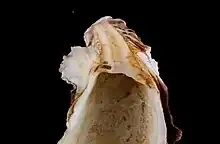
Hinge area in one valve of an oyster shell (Ostreidae), showing the groove that is the resilifer
A resilifer is a part of the shell of certain bivalve mollusks. It is either a recess (a pit or groove of some sort) or a process, the function of which is the attachment of an internal ligament, which holds the two valves together.
An internal ligament (which requires a resilifer to function) is part of the hinge mechanism in certain taxonomic families of bivalve shells, such as oysters and scallops.[1][2][3] A resilifer (and its associated ligament) is the primary structure comprising the type of bivalve hinge that is known as an "isodont" hinge.

The hinge area in one valve of a scallop shell (Pectinidae), showing the internal ligament still positioned in the resilifer
References
- ↑ Tutorial Bivalves State University of New York College at Cortland
- ↑ J.H. Leal. "Bivalves" (PDF). Florida, USA: Bailey-Matthews Shell Museum.
- ↑ Dr. Burt Carter. "Invertebrate Paleobiology on-line syllabus on Bivalves". Georgia Southwestern State University. Archived from the original on 2020-02-25.
This article is issued from Wikipedia. The text is licensed under Creative Commons - Attribution - Sharealike. Additional terms may apply for the media files.